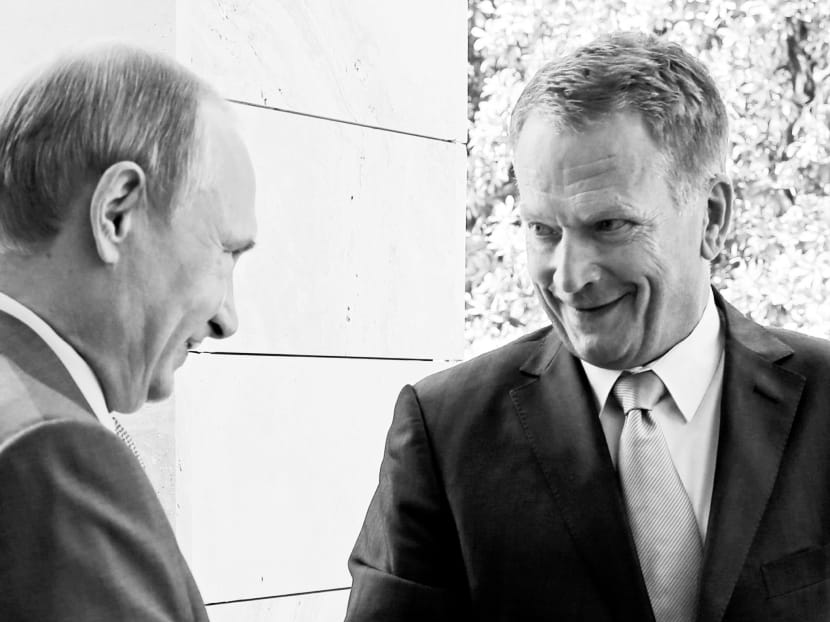‘Finlandisation’ makes a polarising comeback
In Finland, a single word has become the battleground for the Nordic country’s postwar history.

Finnish President Sauli Niinisto (right) became the first EU head of state in months to visit Mr Vladimir Putin in Russia when the two met in August in Sochi. Photo: Reuters
In Finland, a single word has become the battleground for the Nordic country’s postwar history.
Finlandisation might have been a term invented by the Germans in the 1960s and most recently invoked in connection with Ukraine.
However, its recent utterance in Finland itself is reviving bitter memories and inciting harsh words.
Finlandisation refers to how a smaller nation adapts its policies — sometimes unself-consciously — to suit a larger, more powerful neighbour. In the case of Finland, it was the Soviet Union, with which it shared a 1,300km border throughout the Cold War.
Mr Ville Niinisto, Environment Minister and leader of the Green Party, reignited the debate last week by saying his government’s decision to approve a Russian-built nuclear reactor invoked “a sense of Finlandisation”.
The condemnation was swift. Using Finlandisation was “a national insult”, said a prominent historian. “Unfair”, “below the belt” and “less than patriotic” were some of the verdicts of rival politicians.
The debate even cut across families. The Green leader’s uncle, Sauli Niinisto, who happens to be Finland’s President, said: “We have a clear policy, which in no way constitutes Finlandisation.”
HOW SMALL nationS SURVIVE
The dispute is more than only a semantic peephole into domestic Finnish politics for at least two reasons.
First, there are questions to be asked about Finland’s relationship with Russia.
It seems unusual, at a time when the European Union (EU) has been intensifying sanctions against Moscow for its involvement in Ukraine, to announce the approval of a nuclear reactor to be built by a Russian state-owned group, Rosatom, which will also be the largest single shareholder in the project.
“We are putting ourselves where our foreign policy is not led by our values, but instead by our carefulness in trying to do what the Russians want,” said Mr Ville Niinisto, who will resign as Environment Minister this week over the reactor and take his Green Party out of the coalition.
It is not only the nuclear deal. Days earlier, Finland was exposed as the EU country asking for the latest sanctions against Russia to be delayed. Its Foreign Minister even voted against new sanctions altogether at the Finnish government’s internal meeting.
Mr Sauli Niinisto also became the first EU head of state in many months to visit Mr Vladimir Putin in Russia when the two met last month in Sochi
Finnish historian Mikko Majander, who has specialised in the Cold War period, argues that Finlandisation is an unhelpful term due to its pejorative nature.
“Finlandisation is not a good analytical tool —neither for policy nor for history,” he says. “It has been used since its birth in a propagandist way.”
It was coined in West Germany, where opponents of former Chancellor Willy Brandt used it to deride his Ostpolitik policy of rapprochement with communist Eastern Europe.
Certainly, Finnish policies in the 1960s and 1970s were influenced by the Soviet Union — from its studious neutrality in foreign policy to the banning of books and films that might have offended Moscow.
However, many in Helsinki continue to believe that was the best way to survive the Cold War.
That leads to the second level of the current Finlandisation debate. Cold War warriors, including Mr Henry Kissinger and Mr Zbigniew Brzezinski, are arguing that Finland could serve as a model for Ukraine in its stand-off with Russia.
Most Finns believe that is to confuse Cold War politics with their country’s current position, embedded in the EU, which it joined after the collapse of the Soviet Union.
However, some argue that Finland’s Cold War relationship with Russia has proved that the “weaker country” does not have to accept domination from its larger neighbour and can still prosper while cautiously staying true to its ideals.
Prof Majander thinks this aspect of how two countries with different social systems can get along is worthy of study.
“It’s useful to learn ways to be in contact and do business with Russia. We have to find some way out of the crisis,” he says.
Just don’t call it Finlandisation — especially not in Finland.
THE FINANCIAL TIMES
Richard Milne is the Nordic Correspondent at The Financial Times.






